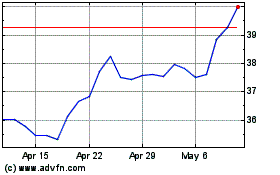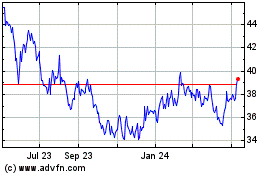P&G Sues Edgewell for Patent Infringement -- Update
August 23 2016 - 5:23PM
Dow Jones News
By Sharon Terlep
Gillette is suing a razor rival, again.
The largest seller of shavers filed a lawsuit against Edgewell
Personal Care Co., maker of Schick brand razors and Edge shave
gels, alleging patent infringement and saying its closest
competitor made misleading claims against the Procter & Gamble
Co. unit.
The civil suit, filed on Tuesday in New York by Gillette, asks
the U.S. District Court to force Edgewell to pull newly launched
private-label razors from store shelves and remove claims from
product packaging that the razors "shave as good or better" than
Gillette's Mach 3 blades. The suit focuses on Edgewell's
three-bladed razors sold by retailers such as CVS and Wal-Mart.
"When a competitor makes false and misleading claims against one
of our products and infringes our patents, it's unfair to
consumers, and to our employees and shareholders," Procter &
Gamble's chief legal officer said in a statement. The company is
also seeking damages.
Edgewell called Gillette's claims baseless, noting that
Gillette's Mach 3 patents have expired.
"We are confident in the quality and performance of our private
label products," the company said in a statement.
The suit against a smaller rival is Gillette's third since last
year and comes as upstart online subscription services chip away at
the 120-year-old company's dominance of the $3 billion U.S. market
for razors and blades.
Gillette last year sued the biggest of those online services,
the Dollar Shave Club, seeking to stop sales of razors it says
infringe on one of Gillette's hundreds of patents. The suit is
pending. Dollar Shave Club is being acquired by Anglo-Dutch
consumer-products company Unilever PLC in a deal announced last
month.
Early last year, Gillette sued ShaveLogic Inc. and four former
employees who went to work for the Dallas startup, alleging the men
breached their contracts with Gillette by sharing trade secrets
with their new company.
Representatives for Dollar Shave Club and ShaveLogic declined to
comment.
In the 20-page complaint against Edgewell, P&G says its
rival must have begun marketing and selling its blades before the
Mach 3 patent expired on April 10 because the Edgewell blades were
in stores as early June, Gillette says.
"It can take years to bring a product to market," a P&G
spokeswoman said. "It is clear from the launch date of Edgewell's
private-label product that it was being designed and produced while
the patents were still active, making it a patent violation."
Patent law prohibits making, using or importing an invention
that is still protected, said patent attorney David Long, formerly
a partner at the Washington, D.C., firm Kelley Drye &
Warren.
"Gillette is trying to say, 'We don't know what they did, but we
have reasonable belief that they must have done something'," Mr.
Long said. "The issue is what relief the patent owner can get if
they establish infringement and the practical value of that
relief."
Meantime, Gillette says internal testing proves the Edgewell
blades don't perform as well as the Mach 3, therefore the packaging
claims amount to false advertising. The company says it used a
software program to measure the number of nicks left behind by each
of the razors on a test group of men, and found that the Schick
razors left "a statistically significant number of greater nicks
and cuts."
Packaging for the Edgewell razors say the blades are compatible
with Mach 3 razor handles, according to the lawsuit.
Gillette launched the Mach 3 in 1998 as the first triple-bladed
razor with a pivoting-head design to allow for shaving with less
pressure, thereby reducing skin irritation. The company, in its
suit, says Mach 3 sales have topped $5 billion since the launch,
not including replacement cartridges or disposable razors with the
same name.
P&G's share of the men's razor and blade businesses in the
U.S. fell to 59% last year from 71% in 2010, according to
Euromonitor. Edgewell's share has slipped as well in that time to
11% from 13%, though sales of private-label razors, which includes
some of Edgewell's, grew to 6% from 3%. Dollar Shave Club, which
was founded in 2011, had 5% of the market last year.
P&G's other brands have occasionally turned to the courts to
battle competitors. In 2014, the company sued a small toothpaste
manufacturer, Hello Products LLC, for saying their toothpaste was
99% natural on its package. P&G also won a patent lawsuit
against a private-label competitor to its Crest Whitestrips
teeth-whitening product.
Write to Sharon Terlep at sharon.terlep@wsj.com
(END) Dow Jones Newswires
August 23, 2016 17:08 ET (21:08 GMT)
Copyright (c) 2016 Dow Jones & Company, Inc.
Edgewell Personal Care (NYSE:EPC)
Historical Stock Chart
From Mar 2024 to Apr 2024

Edgewell Personal Care (NYSE:EPC)
Historical Stock Chart
From Apr 2023 to Apr 2024
